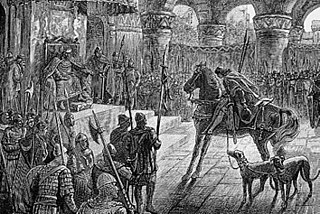
Mabon ap Modron is a prominent figure from Welsh and wider Brythonic literature and mythology, the son of Modron and a member of Arthur's war band. Both he and his mother were likely deities in origin, descending from a divine mother–son pair. He is often equated with the Demetian hero Pryderi fab Pwyll, and may be associated with the minor Arthurian character Mabon ab Mellt.
Manawydan fab Llŷr is a figure of Welsh mythology, the son of Llŷr and the brother of Brân the Blessed and Brânwen. The first element in his name is cognate with the stem of the name of the Irish sea god Manannán mac Lir, and likely originated from the same Celtic deity as Manannán. Unlike Manannán, however, no surviving material connects him with the sea in any way except for his patronymic. Manawydan's most important appearances occur in the Second and Third Branches of the Mabinogi, but he is also referenced frequently in medieval poetry and the Welsh Triads.

Gwyn ap Nudd is a Welsh mythological figure, the king of the Tylwyth Teg or "fair folk" and ruler of the Welsh Otherworld, Annwn, and whose name means “Gwyn, son of Nudd”. Described later on as a great warrior with a "blackened face", Gwyn is intimately associated with the otherworld in medieval Welsh literature, and is associated with the international tradition of the Wild Hunt.

Modron ("mother") is a figure in Welsh tradition, known as the mother of the hero Mabon ap Modron. Both characters may have derived from earlier divine figures, in her case the Gaulish goddess Matrona. She may have been a prototype for Morgan le Fay from the Arthurian legend.
Culhwch, in Welsh mythology, is the son of Cilydd son of Celyddon and Goleuddydd, a cousin of Arthur and the protagonist of the story Culhwch and Olwen. In this tale the etymology of Culhwch is explained as "sow run", but this is likely to be folk etymology. According to the narrative, Culhwch is born to his maddened mother Goleuddydd after she is frightened by a herd of swine. The swineherd finds Culhwch in the pigs' run, and takes him back to his father Cilydd. Culhwch is described as being "of gentle lineage".
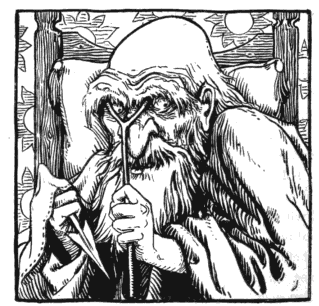
Ysbaddaden Bencawr; "Ysbaddaden, Chief of Giants", is the primary antagonist of the Welsh romance Culhwch and Olwen. A vicious giant residing in a nigh unreachable castle, he is the father of Olwen and uncle of Goreu fab Custennin.

Culhwch and Olwen is a Welsh tale that survives in only two manuscripts about a hero connected with Arthur and his warriors: a complete version in the Red Book of Hergest, c. 1400, and a fragmented version in the White Book of Rhydderch, c. 1325. It is the longest of the surviving Welsh prose tales. Lady Charlotte Guest included this tale among those she collected under the title The Mabinogion.

Bedivere is one of the earliest characters to be featured in the legend of King Arthur, originally described in several Welsh texts as the one-handed great warrior named Bedwyr Bedrydant. Arthurian chivalric romances, inspired by his portrayal in the chronicle Historia Regum Britanniae, portray Bedivere as a Knight of the Round Table of King Arthur who serves as Arthur's marshal and is frequently associated with his brother Lucan and his cousin Griflet as well as with Kay. In the English versions, Bedivere notably assumes Griflet's hitherto traditional role from French romances as the one who eventually returns Excalibur to the Lady of the Lake after Arthur's last battle.
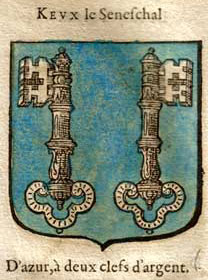
In Arthurian legend, Kay is King Arthur's foster brother and later seneschal, as well as one of the first Knights of the Round Table. In later literature he is known for his acid tongue and bullying, boorish behaviour, but in earlier accounts he was one of Arthur's premier warriors. Along with Bedivere, with whom he is frequently associated, Kay is one of the earliest characters associated with Arthur. Kay's father is called Ector in later literature, but the Welsh accounts name him as Cynyr Ceinfarfog.

Welsh mythology consists of both folk traditions developed in Wales, and traditions developed by the Celtic Britons elsewhere before the end of the first millennium. As in most of the predominantly oral societies Celtic mythology and history were recorded orally by specialists such as druids. This oral record has been lost or altered as a result of outside contact and invasion over the years. Much of this altered mythology and history is preserved in medieval Welsh manuscripts, which include the Red Book of Hergest, the White Book of Rhydderch, the Book of Aneirin and the Book of Taliesin. Other works connected to Welsh mythology include the ninth-century Latin historical compilation Historia Brittonum and Geoffrey of Monmouth's twelfth-century Latin chronicle Historia Regum Britanniae, as well as later folklore, such as the materials collected in The Welsh Fairy Book by William Jenkyn Thomas (1908).
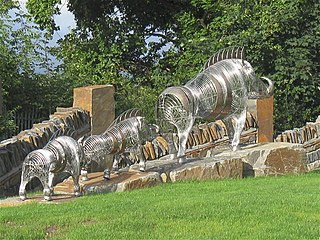
Twrch Trwyth, is a fabulous wild boar from the Legend of King Arthur, of which a richly elaborate account of its hunt described in the Welsh prose romance Culhwch and Olwen, probably written around 1100.
King Gwrfoddw was the King of Ergyng, a south-east Welsh kingdom of the early medieval period. He usurped the throne from Gwrgan ap Cynfyn.
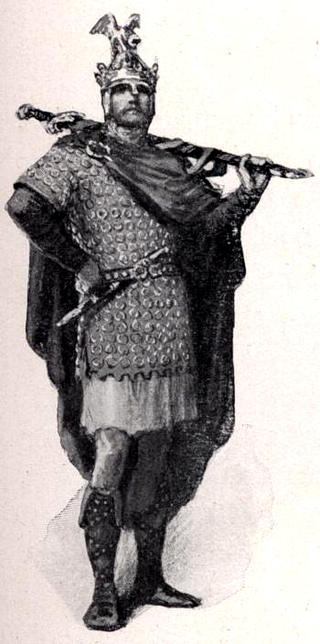
King Arthur's family grew throughout the centuries with King Arthur's legend. The earliest Welsh Arthurian tradition portrays Arthur as having an extensive family network, including his parents Uther Pendragon and Eigyr (Igraine), wife Gwenhwyfar (Guinevere), nephew Gwalchmei (Gawain), brother, and several sons; his maternal lineage is also detailed, linking him to relatives like his grandfather. This complex familial structure is simplified in the shared British and greater European tradition of chronicles and medieval romances influenced by Geoffrey of Monmouth's writings, which instead introduce new characters like Arthur's half-sisters including Morgan and Morgause, theirs children including Yvain and Mordred, and others. Arthur's lineage was later claimed by various rulers, especially the House of Tudor and Scottish clans, reflecting the enduring legacy of his familial ties in medieval and early modern genealogies.
Gwrhyr Gwalstawd Ieithoedd; "Gwrhyr, Interpreter of Languages" is a hero and shapeshifter of early Welsh literature and mythology and a warrior of King Arthur's court at Celliwig. He appears most prominently in the early Arthurian tale Culhwch and Olwen, in which he is handpicked among Arthur's knights to accompany Culhwch on his quest to win Olwen.
Glewlwyd Gafaelfawr is a hero, warrior, and porter in tradition and Arthurian mythology, in which he appears as a knight in Arthur's retinue and chief gatekeeper of his court. He is one of the earliest characters to be associated with Arthur and appears in a number of texts, including Culhwch ac Olwen, Geraint fab Erbin, Iarlles y Ffynnon, Pa Gur yv y Porthur and the Welsh Triads.
Cyledr Wyllt is a warrior and madman in Welsh mythology, known from the early Arthurian tale Culhwch and Olwen.
Goreu fab Custennin is a hero of Welsh and early Arthurian mythology, the son of Custennin, and cousin to Arthur, Culhwch and Saint Illtud through their grandfather Amlawdd Wledig. He is a significant character in the Middle Welsh Arthurian tale Culhwch and Olwen, and also appears in a number of other medieval texts. His name may be derived from Gorneu; "of Cornwall."
Cavall was King Arthur's dog, used in the hunt for the great boar, Twrch Trwyth.
Amlawdd Wledig was a legendary king of sub-Roman Britain. The Welsh title [G]wledig, archaically Gwledic or Guletic and Latinised Guleticus, is defined as follows: "lord, king, prince, ruler; term applied to a number of early British rulers and princes who were prominent in the defence of Britain about the time of the Roman withdrawal; (possibly) commander of the native militia ".
Prydwen plays a part in the early Welsh poem Preiddeu Annwfn as King Arthur's ship, which bears him to the Celtic otherworld Annwn, while in Culhwch and Olwen he sails in it on expeditions to Ireland. The 12th-century chronicler Geoffrey of Monmouth named Arthur's shield after it. In the early modern period Welsh folklore preferred to give Arthur's ship the name Gwennan. Prydwen has however made a return during the last century in several Arthurian works of fiction.










